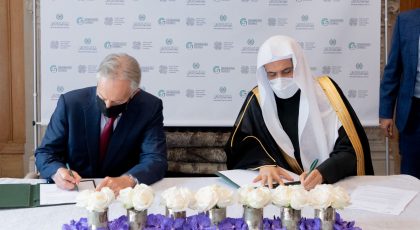
In a paradigm shift of Muslim communities in North and South America, paved the way for and supported by the Muslim World League, His Excellency Secretary-General of the Muslim World League and Chairman of the Association of Muslim Scholars, Sheikh Dr. Muhammad bin Abdulkarim Al-Issa, witnessed the signing of a historic agreement between the symbols of Islamic leaders in the Americas to establish an independent body that brings together the various religious denominations and sects followed by millions of Muslims in Americas and Canada. This is to activate and translate the contents of the “Makkah Charter”, which is considered a turning point in contemporary Islamic thought.
This agreement is a culmination of the first forum that brings together Islamic leaders from the Americas, which was launched by His Excellency the Secretary-General of the Muslim World League in Washington, DC. This forum attracted high-level supporting partners, including members and advisors in the US House of Representatives (Congress) along with a group of non-Islamic religious, community and governmental leaders, who described it as an “exceptional event expressing awareness, responsibility and enlightenment.”
The forum’s workshops focused on a set of important topics, foremost of which is a review of the best ways to benefit from the “Makkah Charter” on a wide scale in the Americas as a comprehensive Islamic document issued by a mufti and senior scholars of the Islamic nation of all Islamic denominations and sects alike, it was a seed of goodness to strengthen and promote their brotherly ties. The forum also addressed youth and women issues, capacity building for religious leaders and religious diplomacy.

Delegates in the conference, based on the outcomes of the workshops, approved the participation of non-Muslim friends from religious, community, governmental and parliamentary leaders in the Americas in this independent body. They also agreed to establish an “international forum for the “Makkah Charter” to be subdivided from it. This body is responsible for coordinating common goals and topics, especially the recent events in the Americas together with promoting the values of brotherhood and coexistence and building bridges of understanding and alliance among followers of religions and cultures in the Americas. This aims to achieve common national and human interests, with an emphasis on strengthening the concept of the national state and warning against the dangers of the concepts of classification and exclusion along with other tasks highlighted by Makkah Charter”

The delegates also decided to form a committee of seven to nine members, taking into account the necessary diversity, working on preparing the statute and governance of the aforementioned body and forum. It also works on activating the recommendations of the workshops of this forum, as they carry enlightening ideas of the utmost importance.
In his opening speech to the Forum of Islamic Leaders in North and South America, His Excellency Sheikh Dr. Muhammad Al-Issa affirmed that the brotherhood of faith is a great bond that cannot be undermined by any of the differences or cannot be penetrated into by any corrupt or prejudiced person because it means honesty in all its meanings, and good faith in others. On the other hand, it means building bridges of mutual trust, forgiveness and tolerance with all, and working together to achieve common goals, leading to the peace of our world and the harmony of its national societies.
His Excellency said, “This life is created by Allah for all, but some people only want it for themselves and their group.” He emphasized that disagreement among people is a part of the nature of this life. The differences between people does not mean the inevitability of clash, conflict and hatred among them, and differences only result in more stubbornness and arrogance, and the events of history bear witness to that. More Islamic texts (Sharia) call for wisdom and positive dialogue. Rather, it commands Muslims to deal with the prominent enemy in a way that is better, not with what the enemy deals with in terms of abuse.

His Excellency added: “Yes, we are keen to bring the viewpoints closer, and the unity of opinion as much as possible, but if this is not possible, this does not mean, as we have previously indicated, the inevitability of clash, conflict and hatred. No religion or logic approve this negative theory as imposing convictions by force is impossible. The evidence is that colonialism, throughout history, failed to change the convictions of peoples with its military campaigns and arms.
Dr. Al-Issa pointed out that it is a positive transformation of our time, that it gave an important lesson to everyone that solid force, no matter how much gains it achieves in the beginning, lives a temporary delusion; because, in the end, it is a long-term or short-term loser. He added: “For this purpose, the “Makkah Charter” which was signed by more than 1,200 muftis and scholars, and more than 4,500 Islamic thinkers, from all Islamic denominations and sects, who came from 139 countries coming to their qiblah in Makkah, included an emphasis on strengthening the role of soft power and consolidating that in the conscience of Muslims, especially the Muslim youth. He also said that the Charter stressed the importance of the dialogue and warned against conflict and clash of civilizations, and hatred speech and racism, and called for comprehensive citizenship.
During his speech about Makkah Charter, His Excellency Dr. Al-Issa reviewed the diversity and exceptional consensus of the Charter that contained Islamic and human values translating the Islamic conscience. The Secretary-General of the Muslim World League, in an interview about the Makkah Charter, went on to say that this historical document warned against attacking places of worship, and considered it a criminal act, and firmly opposed it. The Charter also warned against promoting fatwas (religious opinions) outside the scope of their spatial circumstance, as this is a wrong action and affects the co-existence of the national societies based on a great jurisprudential rule that states that legal fatwas and opinions differ according to time, place, conditions, habits and intentions of people. His Excellency called upon the scholars of each country to issue fatwas suitable for their environment and countries.

Dr. Al-Issa reiterated that the consensus of Islamic and non-Islamic components is good for it and for its religion and for its homelands as consensus is the most important reasons that lead to overcoming malicious hatred campaigns, such as “Islamophobia” and others. Dr. Al-Issa also emphasized, in this context, that the consensus does not necessarily mean the unity of opinion among Islamic denominations and sects, or the unity of opinion in the legal interpretations within those denominations and sects. Dr. Al-Issa stressed the importance of staying away from all causes of conflict and clash within religious components, and of giving priority to the logic of conscience, including the language of kindness, patience, tolerance and generosity.

However, His Excellency said that let us give more attention to Makkah Charter to be able to answer some important questions about it: Why is this Charter important? because the Islamic nation, with its various denominations and sects, need one consensus in a number of urgent contemporary issues. And why was holding the conference of this document in Makkah? because it is the universal qiblah (destination) of every Muslim man and woman. The following question: Why was the Conference of the Carter in the Holy month of Ramadan? because it is a holy month for Muslims, and every Muslim seeks its blessings and forgiveness from Allah the Almighty. The next question: Why did the call come to all Islamic denominations and sects? because the nation’s consensus, especially on important contemporary issues require unity in its jurisprudence, based on the unity of its sincere conscience.
His Excellency the Secretary-General of the Muslim World League concluded his speech by saying: “I am very pleased to see the Muslim Communities in North and South America gathered today. They are united by Muslim brotherhood, understanding and cooperation with their pioneering national models of coexistence and harmony together with their enlightened perception that their religious identity does not conflict with their national identity, but rather reinforces it.
Then the speeches of the delegates in the forum continued. US Congressman, Mr. Andrei Carson, stressed the importance of protecting the rights of Muslims around the world, and that work is ongoing with the Congress on this goal.
Both Imam Muhammad Majid and Sayyid Muhammad Baqir Al-Kashmiri touched upon the global humanitarian contents of the “Makkah Charter”, stressing that it is a major tool for promoting the inter-faith coexistence and deepening community ties.
Former US ambassador for international religious freedom, Mr. David Saberstone, one of the most influential leaders of religious opinion in American circles, saw “Dr. Muhammad Al-Issa’s call for all of us to work together a role model for the world that we must make for the goodness of humanity.
Imam Talib Sharif underscored the key message for the advancement of humanity in the Makkah Charter, while female famous thinker and researcher Rahma Abdel Alim affirmed that women can lead in all areas mentioned in the “Makkah Charter.







